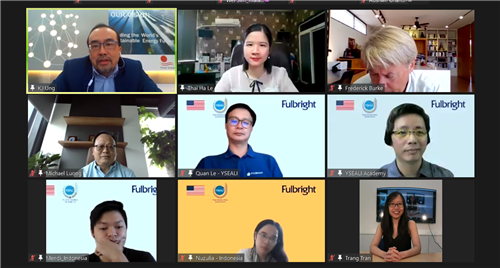The photo reminds Ha of the days when she was the only Vietnamese predoctoral fellow at NTU’s School of Humanities and Social Sciences. Her predoctoral fellowship was fully funded, and she was just nearly 22 years old and had just obtained Bachelor’s degree at NTU. Six months prior, she returned to Hanoi and worked in a Japanese bank there. Although she found her job, her colleagues, and the working environment pleasant, she always felt like she did not belong there.
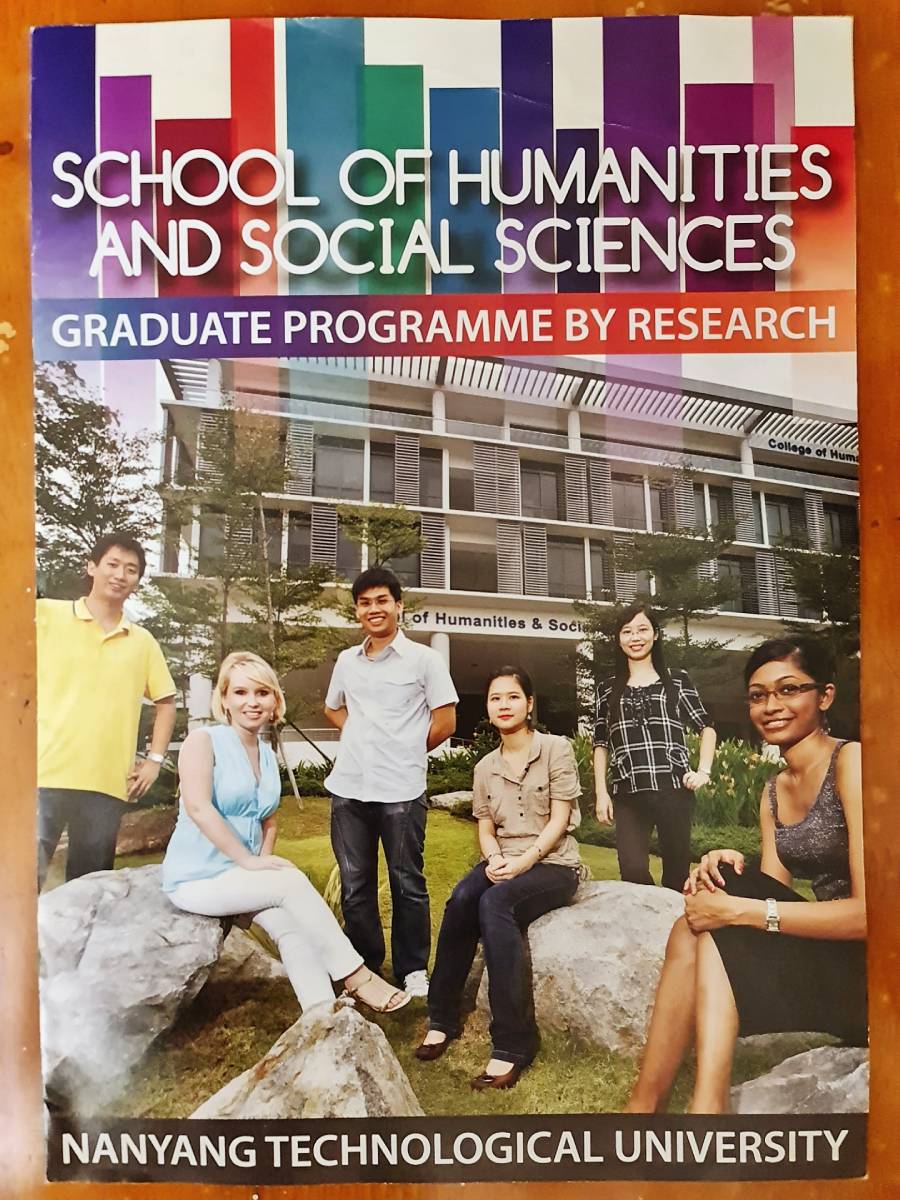
When the announcement broke that she was granted the predoctoral fellowship with full funding for four years, she was a little worried. Thai Ha had seen the examples of other fellows who had to change their majors or topics of research because their dissertations came to a dead end. She was also warned by her instructor that it could take her 5-6 years to finish the program. She started studying like crazy. More than two years later, she finished the program at NTU with the highest score (4.92/5.0) in her class and excellent research achievement on energy economics with two papers accepted to be published in prestigious international scientific magazines. Energy economics has become a topic that draws a lot of attention for a decade now.
In August last year, 10 years after Ha started the predoctoral fellowship, she received an acceptance letter announcing her new scientific research was approved for publication in an international journal, making it her 40th international publication.
“The most obvious change in me after 10 years is probably the attitude towards research. Ten years ago, I felt a bit pressured – not because of the program or the instructor – but because I set my own expectations for the quantity and quality of scientific publications; gradually, I find the passion and love for research in the most natural way,” Ha wrote on her Facebook page.
After returning to Vietnam, Ha started her career as a lecturer at RMIT University. She emerged as an active lecturer in economics and made an impression in the field of research with a remarkable record of international publications. So far, she has more than 40 scientific research papers published by prestigious international academic journals, including leading journals in the fields of energy economics, environment, and other applied economics such as Energy Economics, Energy Policy, Energy Journal, International Review of Financial Analysis.
All of her research papers are in the ISI/Scopus category, of which about 85% are in the Scopus Q1 or ABDC (Australian Business Deans Council) group, with research quality rated A/A*. She is also a co-editor of an independent book publisher and has been (co-)author of chapters in nine books published by prestigious publishers such as Elsevier Science, Routledge (London), Springer, Asian Development Bank Institute (ADBI-Japan), and World Scientific Publishing. The RePEc Economic Research project published in June 2021 ranked Ha third in terms of scientific publications in economic research in Vietnam.
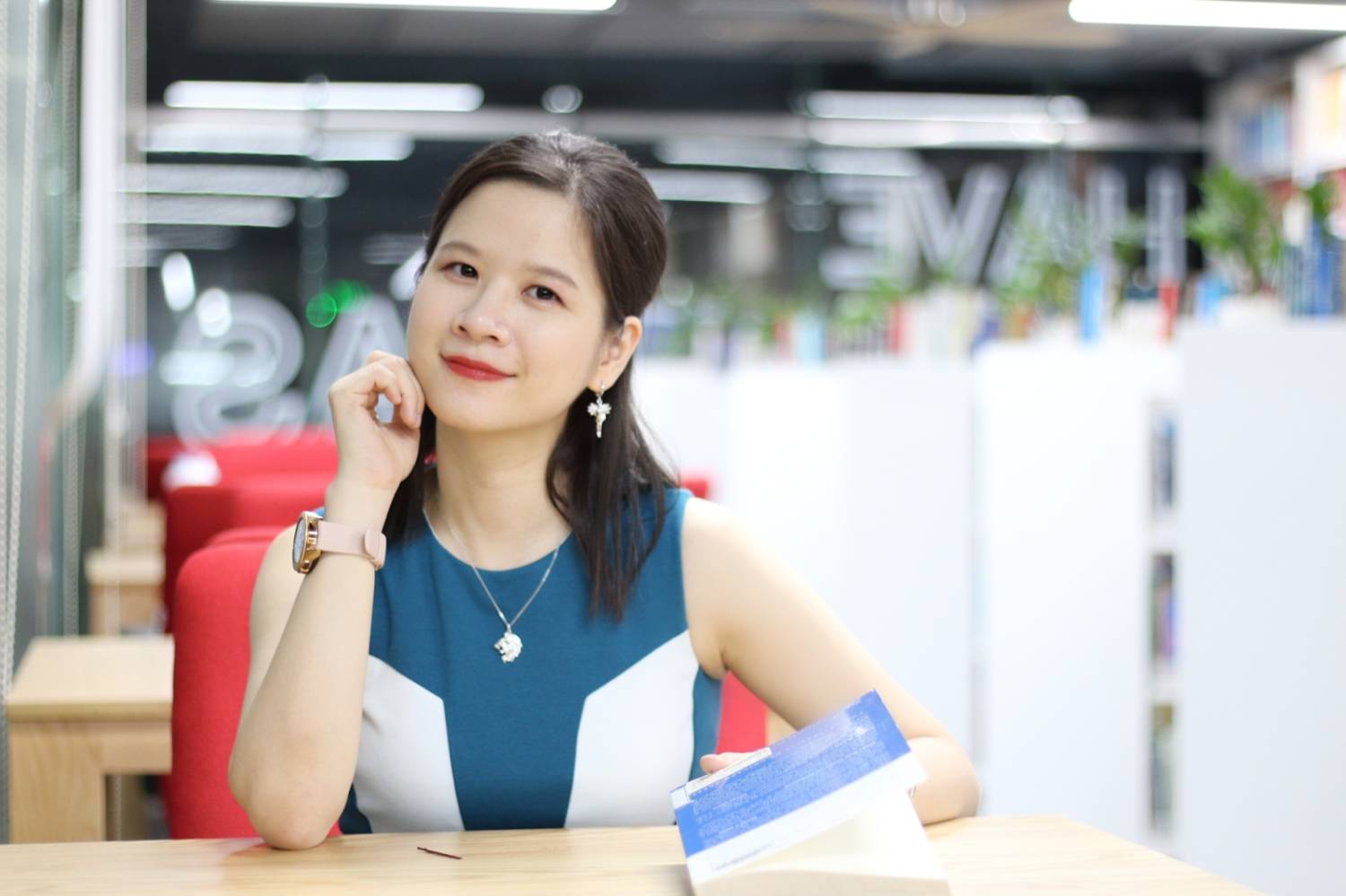
Le Thai Ha was the only Vietnamese predoctoral candidate at HSS-NTU at the time, pursuing a Ph.D. on a full-ride scholarship at 22 years old, not long after she completed her Bachelor’s degree at this prestigious university in Singapore.
During the first decade of her career, Thai Ha focused on research with a variety of internationally published papers. Her career took a new turn after a meeting with a research fellow in late 2018.
An important encounter
In late 2018, Dr. Le Viet Phu of Fulbright School of Public Policy and Management (FSPPM) met Ha while participating in the thesis defense committee of Vietnam-Netherlands Master of Economics program at Ho Chi Minh City University of Economics. As they had the same occupation of teaching and research on energy economics and environmental economics, they quickly connected and exchanged ideas on research activities.
“What impresses me is that Ha is very young but is among a few leading researchers in terms of internationally published papers. She has a great passion for research – a field that is usually dominated by males. With a good education background, a modern research mindset, and a large number of international publications, Ha represents the new generation of researchers in Vietnam,” Dr. Phu commented.
The encounter with Ha became an opportunity for Dr. Phu to connect Thai Ha with FSPPM. She began to engage in policy research – a unique strength of FSPPM, the school with a team of leading economic policy experts in Vietnam. For more than two decades, rooted as Fulbright Economic Teaching Program (FETP), the school has been deeply involved in policy dialogues to make a positive impact in the government’s policy-making process. The foundation for these dialogues is high-quality, independent, and objective policy research that looks directly at Vietnam’s weaknesses. With constructive criticisms and applicable research, Fulbright has been deeply engaged in the process of addressing major challenges that Vietnam is facing.

Dr. Le Viet Phu (left) and Dr. Le Thai Ha (right) in a seminar on environmental issues at Fulbright School of Public Policy and Management.

Dr. Le Thai Ha moderating a panel discussion on economics with her colleagues from Harvard Kennedy School and Vietnamese scholars.
During the few months of participating in seminars and other events at FSPPM, Thai Ha was really impressed with the school. This new experience made her realize the limit of her work – it was only known by the research community. She became excited about having her research applied to solve real world problems. On one occasion, Dr. Phu invited her to join a field study trip to a wind and solar energy project site. Although she had done some research on renewable energy, it was the first time she joined a field study trip. The stories of local people and businesses, their concerns over energy policies, and their experience in using energy broadened her horizons.
“It was an eye-opening experience for me. I realized that my research papers failed to meet real life expectations. And I realized that research that are not connected with the real world will be useless,” Ha said.
FSPPM had for decades focused on policy research and analysis, with priority given to institutional, policy, and legal issues that have a direct impact on Vietnamese society. FSPPM’s lecturers and economic experts had been involved in academic research for many years, and it was high time for the school to find the next generation of researchers.
In early 2019, Dr. Vu Thanh Tu Anh, FSPPM’s director, invited Ha to join FSPPM as Director of Research. FSPPM aspired to become a public policy school recognized for three aspects: teaching, research, and policy feedbacks that reach the global standards. In 2019, FSPPM received accreditation from the Network of Schools of Public Policy, Affairs, and Administrations (NASPAA), becoming the first accredited public policy school in Southeast Asia. FSPPM’s Master of Public Policy Program is accredited by NASPAA for a period of 7 years, which is the highest possible accreditation outcome that one can expect.
The school’s policy feedbacks were mostly based on academic research or interpreted from the results of academic research. Fulbright experts always tried to interpret policy studies in an appropriate way for policymakers in a transitional economy like Vietnam.
“The difficulties that public policy schools are usually facing are how to associate academic research with both sound theory and sufficient practice and interpret them in the language that policymakers can understand easily. Dr. Le Thai Ha does academic research, but she also delivers policy implications via her studies. This shows the courage of the researcher to step out of the comfort zone of academic research. Presenting research with policy implications is a way to measure whether the research can be applied in real life. As such, researchers are more engaged, riskier, and potentially more impactful, and this is in line with the mission of a public policy school like FSPPM,” Dr. Vu Thanh Tu Anh talks about the role of Thai Ha.

Sweden’s Ambassador to Vietnam, Ann Mawe, and Dr. Le Thai Ha in the seminar “Nordic Green Capitals – Leadership, Governance, Sustainability and Innovation” organized by the Nordic Embassies in Vietnam (Denmark, Finland, Norway, and Sweden), in coordination with the Fulbright School of Public Policy and Management on the occasion of the Nordic Day 2021.
This year, Ha has just published two policy studies used for publication in the Asian Development Outlook by the Asian Development Bank and Center for Strategic and International Studies (CSIS).
“Having published papers that satisfy my passion for research while also is applicable in real life makes me even happier. Academic studies, to some extent, are not compatible with reality. If we can have policy implications in our academic studies, it would be ideal,” Ha talks about her goal of developing research at FSPPM.
As the Director of Research at FSPPM, Ha has participated in many policy dialogues with ministries, agencies, and organizations and joined many local, regional and international economic forums. This allows her to test her research and recommendations and see how they are perceived and reviewed.
“I remember my first meeting on environmental issues with the Ministry of Natural Resources and Environment chaired by Minister Tran Hong Ha. Although there have been many studies on the environment from an economic perspective, it was the first time that I heard directly from the ministry and other agencies about their feedbacks on my studies’ recommendations and policy implications. It helped me clearly see the applicability of my research,” Ha said.
The launch of FREP
Early this year, FSPPM announced the launch of the Fulbright Review of Economics and Policy, an international journal to be published on the platform of Emerald Publishing. FREP is an academic, peer-reviewed, open-access journal that publishes theoretical and empirical results in all the areas of economics and public policy.
As soon as the announcement was made, a friend asked Ha why she kept silent about the news for too long. Hardly he knew that Ha lost a lot of sleep preparing for the launch of FREP at the request of Dr. Vu Thanh Tu Anh for over a year since the outbreak of Covid-19.
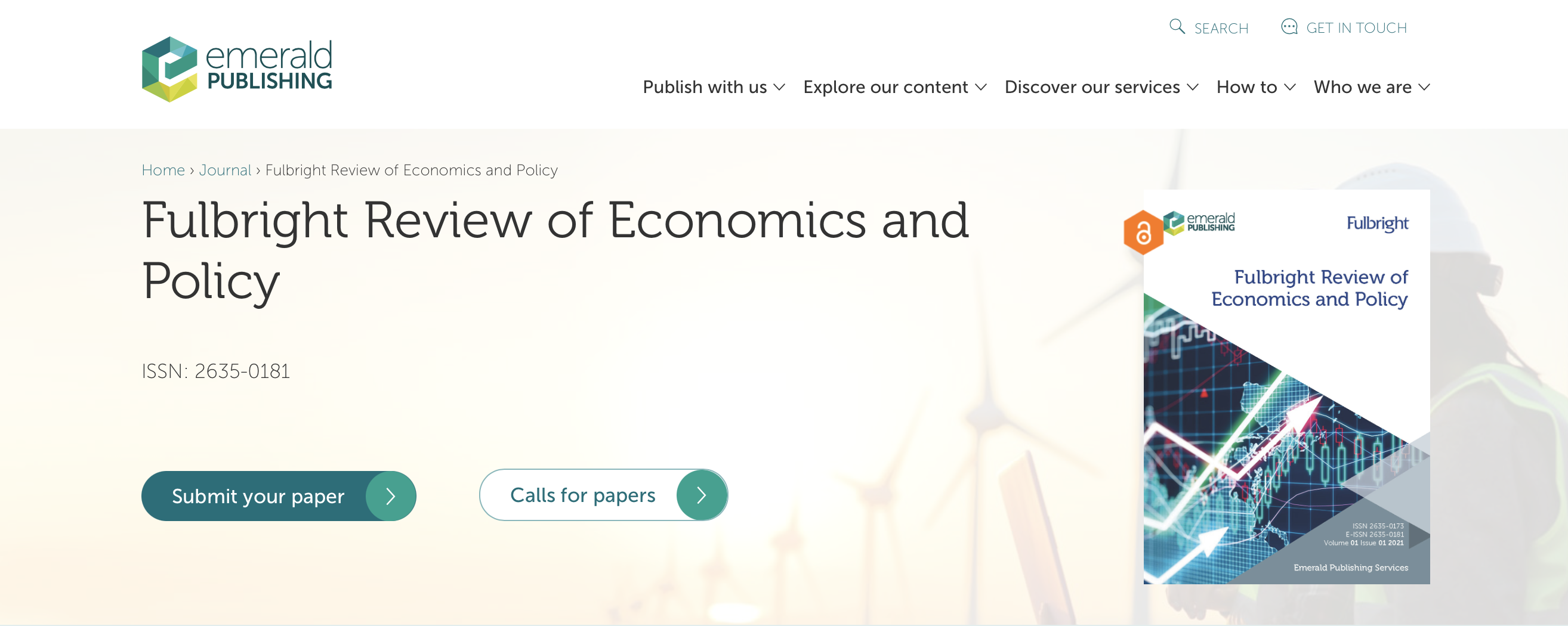
FREP, by its name, chooses to focus on two distinctive fields of research: economics and public policy. Economics is a highly theoretical field of inquiry tapping into large datasets and utilizes sophisticated mathematical formulas in its approach. On the other hand, public policy explores more realistic problems making use of analytical observations in policies, law, and institutions that directly impact people’s lives. FREP aims to make the connection between these two fields by integrating theoretical findings in economics to seek effective policy solutions and providing empirical evidence for policy prescriptions.
“We want to create a forum for the exchange of serious, evidence-based researches that have clear theoretical foundations, solve problems, and make specific policy recommendations for issues in Vietnam, as well as in the region and the world. We want to measure the impact of research, not only by counting how many other studies cite them but by seeing how many people actually benefit from the right policies inspired by economics and policy studies,” said Dr. Tu Anh, the mastermind behind FREP’s content strategy.
As the editor-in-chief of the journal, Ha invested a lot of efforts in the first year of its launch. She describes thinking about it even in her dreams. When the whole world was severely affected by the Covid-19 pandemic, her discussions with the UK publisher in 2020 only focused on technical issues. Although she is also a member of the editorial board of several prestigious international journals, running a brand-new journal was still an unprecedented experience for her. Before reaching the agreement with Emerald Publishing, she failed to contact and find the right publisher many times. The biggest challenge was to gather researchers and maintain the quality of the journal as expected.
“It was an experience I’ve never had in my career,” she said.
What encouraged Ha to keep going is that although FREP is a new name in the international community of academic research journals, it had strong professional backup from leading scholars, just like FSPPM in the early days of its establishment. An editorial board consisting of famous scientists and scholars from leading universities in the world, particularly in the United States, accepted to serve as consultants for the journal. Many of them have strong connections with Fulbright school since the early days of its establishment more than 25 years ago, such as Prof. Dwight Perkins (Harvard University), Prof. David Dapice (Harvard University), Prof. James E. Anderson (Boston University), Prof. Terry Buss (U.S. National Academy of Public Administration), Prof. Eddy Malesky (Duke University), and Prof. Scott Fritzen (University of Oklahoma).
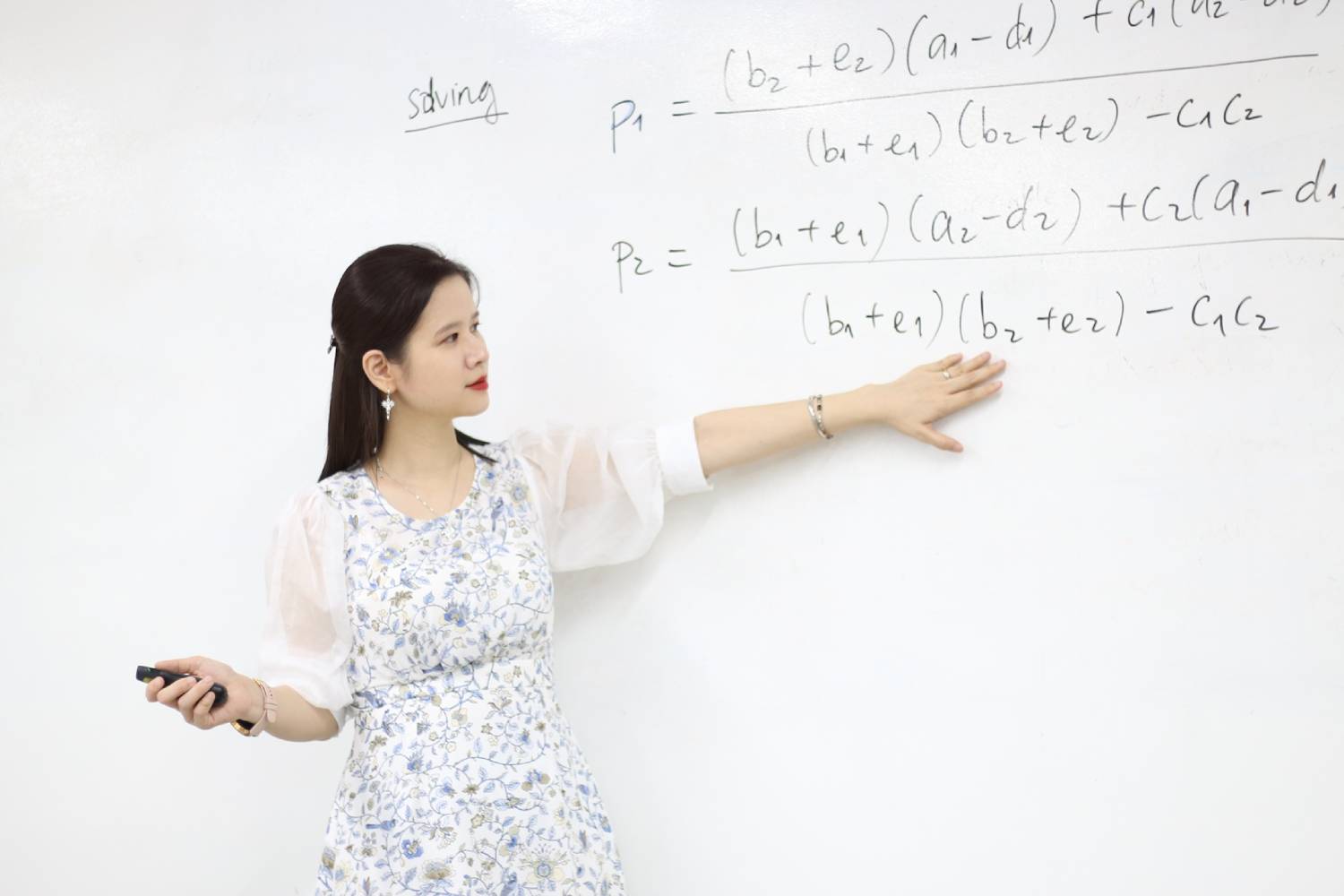
Stepping out of the comfort zone
In addition to doing research, Ha is a senior lecturer in economics at FSPPM. She finds the joy of life in doing research and teaching. An optimistic person, she always feels happy with little things every day. It can be an acceptance letter from a publishing journal or a fruitful lecture. She is usually asked by her students: “Why do you do so many studies?”
“Today I received the acceptance letter from a journal. I felt so happy like the sun was shining through my heart. I found the answer to the question of why I do so many researches: I want to receive acceptant letters so that I could be motivated to do other researches,” she shared on her Facebook.
Ha considers doing research a way to relax and relieve the pressure of work and life. When she was waiting for a reply from a journal to publish her paper or feeling sad during the days of social distancing in the Covid-19 pandemic, she focused on her research. Doing research is not always a path full of roses. Along with published papers, she had many papers rejected. Usually, the rate of papers approved by prestigious scientific journals in the ISI category is around 10%. Therefore, Ha attributes her success to hard work and perseverance.
After spending a year on technical preparations for FREP, Ha and her colleagues spent another six months preparing the content for the first issue in the summer of 2021. Her busy schedule also includes lecturing in the Fulbright Master of Public Policy program and the Young Southeast Asian Leaders Initiative (YSEALI) Academy’s programs at Fulbright University Vietnam. The first special edition of FREP and a launching workshop with researchers will focus on the world’s and the region’s post-Covid policy response.
“At Fulbright, I have many opportunities to interact, not only with the government’s policymakers but also those in the private sector. With my current job, I also have many opportunities to deliver talks in other local universities. The more I expand my network, the more I appreciate the environment I am working in. It is an environment in which I can develop my expertise without being distracted. At Fulbright, I step out of my comfort zone in research and teaching,” Ha concluded.
Xuân Linh
Related Articles
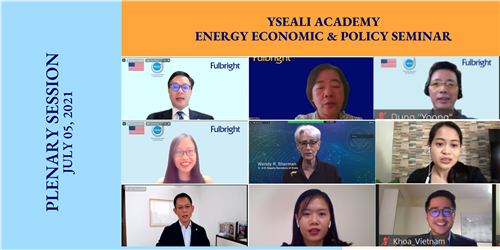
YSEALI Academy – the launchpad for young ASEAN leaders

Energy Economics and Policy Seminar: Day 7 Recap
